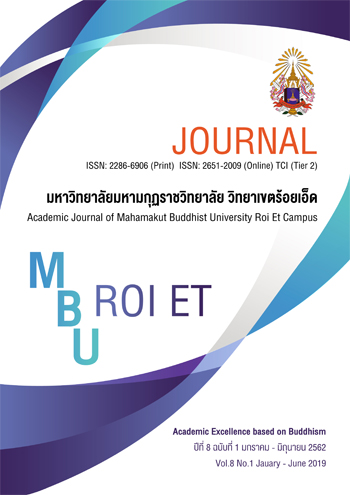Development of learning activities model with experience to strengthen Thai dessert skills, Grade 5
Main Article Content
Abstract
This aims of this research was to 1) Development of learning activities model with experience to strengthen Thai dessert skills, Grade 5 2)Develop learning achievement activities model with experience to strengthen Thai dessert skills, Grade 5 3) To study the satisfaction with Development of learning activities model with experience to strengthen Thai dessert skills, Grade 5 4) To study the durability of learning activities model with experience to strengthen Thai dessert skills, Grade 5
The samples used student study in Grade5/2 for 30 students by Cluster Random SamplingTools used in research of Development of learning activities model with experience to strengthen Thai dessert skills, Grade 5. The Achievement measure Career and Technology. Statistics used in data analysis were frequency, percentage, mean, and standard deviation.
The study found that : (1) Development of learning activities model with experience to strengthen Thai dessert skills, Grade 5. The study found that the student’s efficiency was 80.85/84.06 (2) Comparison of learning achievement activities model with experience to strengthen Thai dessert skills, Grade 5. Their post-attending, after learning was differentiated significant at level .05 (3) Performance activities model with experience to strengthen Thai dessert skills, Grade 5. The assessment of creativity is very good. (4) Durability of learning activities model with experience to strengthen Thai dessert skills, Grade 5.Students have the durability to learn.
Article Details
References
ศรีสมร คงพันธุ์. (2544). เข้าครัวเป็นอาชีพ. กรุงเทพมหานคร : บริษัท สำนักพิมพ์แสงแดด จำกัด.
สุภาพร คำพิมาย และกิติพงษ์ ลือนาม. (2555). การศึกษาผลสัมฤทธิ์ทางการเรียนหน่วยการเรียนรู้การหาร และพฤติกรรมการทำงานกลุ่มของนักเรียนชั้นประถมศึกษาปีที่ 2 จากการจัดการเรียนรู้โดยใช้เทคนิค SIAD. วารสารวิชาการเครือข่ายบัณฑิตศึกษา มหาวิทยาลัยราชภัฏภาคเหนือ. 3 (4). 89–100.
Hickcox, L.K. (1991). A Historical Review of Kolb’s Formulation of Experiential Learning Theory. Dissertation Abstracts International. 52 (5). 112-A.
Lee, P.L., & Moffeit, K.S. (1990). Case for Experiential Learning for Internal Auditors. Internal Auditing, 6 (1). 40-45.
Wallerstein, H.A. (1971). Dictionary of Psychology. New York : Penguin Books, Inc.


